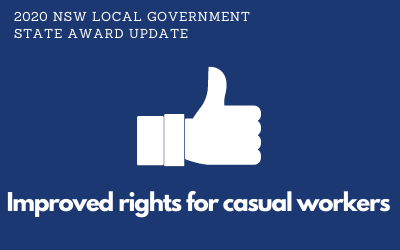Please read this and form your own conclusion.
The negotiations for the 2020 NSW Local Government State Award commenced on Monday 23 September, 2019.
Based upon the past 25 years of custom and practice, negotiations usually commence around 12 months before each award is due to expire. The USU had its award Log of Claims ready by 1 July, 2019 but waited until the Employer’s Association had finalised their Log of Claims in mid-August so we could exchange our respective Log of Claims at the same time.
Negotiations in the past have usually concluded around a month before the existing award is due to expire. The Unions then seek endorsement of the proposed new award from their Membership and the Employer’s Association from their Board.
The USU has given delegated authority for their Award Negotiators to negotiate a package to take to their Membership for endorsement or rejection.
In 2017 the USU conducted 347 mass meetings across NSW at every Council covered by the award over 10 working days in late June, which resulted in a 98.98% yes vote to adopt the award. At each of these meetings the exact same information was read out and distributed to ensure consistency.
Unfortunately it would appear that the same delegated authority granted to the Union negotiators to negotiate a package in face to face good faith bargaining meetings for endorsement or rejection at the conclusion of negotiations is not being conducted by the Employer’s Association.
It appears that following our face to face negotiations during which it appears that some positive progress is being made, the LGNSW negotiators report back to a group of 13 Human Resource Officers and one General Manager on their non-elected Award Working Party where it seems any progress made in the negotiations to improve the award is rejected by a group who are not involved nor are they present in the negotiations.
On reviewing the members of this employer group (who are listed on the LGNSW website) we see a group who overwhelmingly have no history of a positive working relationship in their Councils with the Unions, with a few exceptions.
The USU entered into these award negotiations for the 2020 award in good faith.
Good faith bargaining requires good communication, a preparedness to genuinely consider offers and proposals made by other bargaining representatives and to take account of the bargaining representatives reasons for their proposals.
How can this occur if the Employer’s Association is reporting back to a third party who are neither experienced nor involved in the face to face award negotiations?
The USU has provided the Employer’s Association with a significant amount of supporting written and photographic evidence for many of our claims, all of which seem to be rejected outright by the non-elected non-representative employer’s group.
The Union’s respective Logs of Claim seek to first strengthen current wording contained within the award to seek improved compliance with existing long term award commitments agreed to by the Unions and the Employers going back as far as to the 1992 award.
There is a clear misuse in many Councils in the long term use of insecure forms of labour such as casuals, labour hire and term contract which should be in permanent employment which is in breach of the intent of the award.
There is inconsistent compliance with the award obligations to provide staff with relevant training plans and career paths and access to more fulfilling and better paid work.
These and other existing award commitments are being breached by many Councils, yet there is opposition to improving the wording of the award to better ensure compliance.
The Unions’ Logs of Claims seek to improve NSW Local Government in accordance with the Employer’s Association’s own “NSW Local Government Workforce Strategy 2016-2020” as adopted by the elected LGNSW Board.
Yet the award Log of Claims from LGNSW clearly contradicts and undermines their own Workforce Strategy as adopted by their elected Board.
How can this happen and who is responsible at LGNSW for ensuring that they comply with their own adopted workforce strategy?
Below we include a brief summary comparing the LGNSW workforce strategy to their log of claims which clearly supports our allegations.
This document attempts to summarise some of the key focus areas identified in the LGNSW Workforce Strategy and compare those to the LGNSW Award Log.
The submission of the USU is that the LGNSW Award Log does not advance the focus areas identified in LGNSW’s own Workforce Strategy, and in many instances the LGNSW Award Log advances claims which directly work against their own focus areas.
COMPARISON DOCUMENT: LGNSW AWARD LOG OF CLAIMS & LGNSW WORKFORCE STRATEGY
|
WORKFORCE STRATEGY |
AWARD LOG |
|
The capacity to develop and use the skills of its workforce to meet the needs and aspirations of its communities (pg. 2) |
No claims advanced which materially improve skill use and development in the sector |
|
Improving workforce planning and development (pg. 2) including addressing skill shortages (pg. 3), attracting a diverse workforce (pg. 8), and investing in skills for mature workers (pg. 11) |
No claims advances which material improve workforce planning and development in the sector |
|
Promoting local government as a placed based employer (pg. 2) and employer of choice (pg. 3) |
Expanding the ordinary hours to Monday-Sunday for all roles (claim 8) |
|
Importance of attraction, retention and talent management (pg. 3) |
Removing the 35 hour week (moving to a 38 hour week) for all employees (claim 7) |
|
Skills shortages in professional areas (pg. 5) |
Removal of the Civil Liability Allowance (claim 6) |
|
Local government will need to do more to position itself as an attractive career option for prospective and existing employees (pg. 7)
|
Expanding the ordinary hours to Monday-Sunday for all roles (claim 8) Removing the 35 hour week (moving to a 38 hour week) for all new employees (claim 7) Expanding the spread of hours for roles limiting the hours during which people are entitled to shift allowance (claim 9) |
|
Delivering flexibilities that attract and retain a workforce with the skills and knowledge required by the business (pg. 10)
|
Expanding the spread of hours for roles limiting the hours during which people are entitled to shift allowance (claim 9) Limiting circumstances in which overtime is payable (claim 10) |
|
Education and training improve employment prospects for individuals, the productivity of workplaces and the capacity of people and organisations to adapt to changes in demand for products and services (pg. 11) |
No claims advances which materially improve education and training in the sector |
SOME IMPORTANT QUESTIONS TO ASK!
How can the Employer’s Association LGNSW claim to be bargaining in good faith if their Negotiators don’t have the required delegated authority to negotiate a package to be provided to their board for endorsement or rejection following the conclusion of negotiations?
Does LGNSW truly believe that their Award Committee of 13 HR Officers and 1 GM is representative of the views of the Councils across NSW and can each one of them demonstrate that the decisions they are making are supported by their own Council and Councillors as well as the industry in general?
Why does the LGNSW Log of Claims contradict their own Workforce Strategy?
Just how does the LGNSW Log of Claims improve the working lives of Council staff?
Why has there been no evidence provided to support the LGNSW Log of Claims?
Why is the evidence which is being provided by the USU and other Unions to support some of their award claims being ignored or rejected by LGNSW?
Based on all of the above, do you believe that the Employer’s Association is bargaining in good faith?




